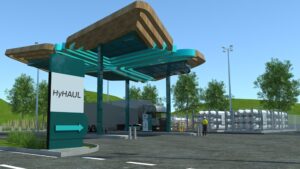
As the sector looks to rapidly decarbonise, a number of projects are currently underway around the UK to provide a choice for to operators who want to adopt this green, sustainable alternative.
For example, Protium, the UK’s largest green hydrogen energy company, and its partners, were recently successful in applying for more than £30m from the Department for Transport and Innovate UK to launch the Hydrogen Aggregated UK Logistics (HyHAUL) project.
As part of the UK Government’s zero emissions HGV and infrastructure demonstrator programme, HyHAUL will roll out 30 hydrogen fuel cell HGVs to haulage operators primarily operating along the M4 corridor by 2026, with further ambition to deploy 300 vehicles by 2030.
Alongside HGVs with attractive operational range and flexibility, HyHAUL will also deploy a network of refuelling stations to ensure viable truck operations across designated routes.
Hydrogen will be sourced from multiple green hydrogen projects across South Wales including Protium’s “Pioneer 2” and other projects.
Led by Protium, HyHAUL brings together the long-distance hydrogen HGV value chain that includes green hydrogen generation, hydrogen logistics, refuelling infrastructure providers and fuel cell HGV manufacturers.
In its first phase, the consortium partners include ReFuels’ CNG Fuels, Scania, NRG Riverside, and Reynolds Logistics.
Trucks will be provided by multiple manufacturers and initial hauliers include established companies such as EV Cargo and FSEW.
HyHAUL will also provide vehicle manufacturers and fleet operators with vital operational data on the performance of first-generation fuel cell electric trucks and will help to remove barriers to wider adoption across the industry.
It will also stimulate future demand for green hydrogen, supporting the wider hydrogen economy across the country.
HyHAUL builds on the UK Government’s Hydrogen Strategy and the Welsh Government’s National Transport Delivery Plan to help decarbonise transport.
Chris Jackson, CEO of Protium, said: “HyHAUL showcases the incredible potential for green hydrogen within transportation, a sector that has one of the largest emissions in the UK.
“Our project provides a commercially viable solution to lower the emissions of long-distance haulage, a notoriously hard-to-abate area of the sector.”
Meanwhile, Element 2 is constructing a new, high-volume hydrogen refuelling station at Teesside International Airport, supported by a grant from Innovate UK.
In a strategic alliance with Teesside International Airport and Innervated Vehicle Engineering (IVe), the £4.1M project is set to turn Tees Valley into a hub for zero-emission transportation and airside operations by 2024.
The project will see the development of a modern, large-scale hydrogen refuelling station at the airport, supporting a range of long-term trials of commercial vans, led by IVe, as well as additional passenger cars and airside support vehicles, led by Tees Valley Airport.
This initiative will enrich the region’s refuelling infrastructure with green hydrogen supply, aiming for a substantial yearly reduction of 240,000 tonnes of CO2 emissions.
“The strategic location of Teesside Airport, with its proximity to key transport links and major freight depots, provides the perfect platform for this project”, said Tim Harper, CEO of Element 2.
“As we expand the hydrogen refuelling infrastructure throughout the UK, projects such as this empower fleet operators to gain proficiency in running zero-emission HGVs.”

Once fully delivered, the fleet will comprise 54 vehicles and will be one of the biggest hydrogen bus fleets in Britain.
It will be served by a liquid hydrogen refuelling station – the largest of its kind in Europe providing the equivalent of fuel for over 100 buses per day – and operated by Air Products.
The single-decker GB Kite Hydroliner zero-emission buses, manufactured by Wrightbus, are the first hydrogen powered vehicles in Go-Ahead’s fleet of more than 6,000 buses, and will operate on routes that are intensively used – operating 24 hours a day, 365 days a year.
Hydrogen will be stored at the Metrobus Crawley depot in liquid form, before being converted to gas held in tanks on the roof of vehicles.
Manish Patel, Air Products Hydrogen for Mobility Director UK, said: “We are proud to be part of this exciting project, where we intend to deliver green hydrogen produced in Immingham from imported renewable energy sources such as the NEOM Green Hydrogen project, where there’s an abundance of sun and wind.
“The project is an excellent example of companies collaborating and pioneering in the energy transition space.
“Together, we are making the decarbonisation of public transport a reality; our liquid hydrogen-fed refuelling station will be able to reliably serve the depot’s full fleet.”
Also, clean energy pioneers Hygen and N-Gen are working in partnership to deliver the Bradford Low Carbon Hydrogen (BLCH) production facility, which could achieve the decarbonisation equivalent of removing 800 diesel-fuelled buses a day from West Yorkshire roads.
The development, which will be built on the Northern Gas Network (NGN) Birkshall gas storage site in Bradford, will deliver one of the UK’s largest low carbon hydrogen production facilities with the aim of using renewable energy to produce hydrogen.
Businesses and other users in West Yorkshire will be able to use the refuelling facilities, with distribution experts Ryze delivering hydrogen to industrial users across the region.
The project has been awarded money under the Government’s Hydrogen Production Business Model/Net Zero Hydrogen Fund.

“We very much hope that this project will be replicated in other cities across the UK to provide low carbon energy for generations to come.”
Hydrogen technology has great potential to decarbonise transport as well as help grow the economy and the schemes announced are likely to be joined by many more over the next few years.








